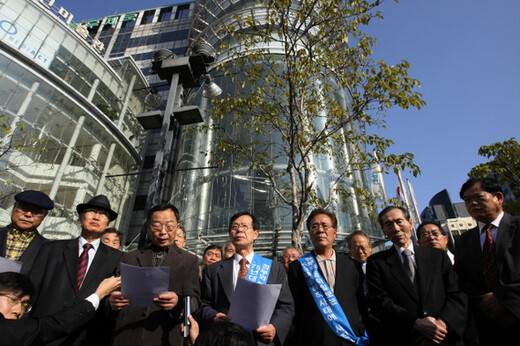hankyoreh
Links to other country sites 다른 나라 사이트 링크
DongA Ilbo and the government are told to apologize for past civil rights violations

In the latest of a series of findings, the official government Truth and Reconciliation Commission has determined that one of the more famous press suppression cases of the Park Chung-hee years, the “DongA Ilbo Advertising Coercion and Forced Layoff Case” during 1974 and 1975, was orchestrated by the Korean Central Intelligence Agency (KCIA, now known as the National Intelligence Service), and that the DongA Ilbo itself went along with what was unjust oppression by the Yusin regime, as it was called.
In a report issued October 29, the commission formally recommends that the state and the DongA Ilbo “apologize to those who were fired and make appropriate amends” for what the report defines as “a case in which the state power apparatus, in the form of the KCIA, engaged in serious civil rights violations.”
According to the commission, the KCIA summoned companies with significant advertising contracts with the DongA Ilbo Company to the KCIA’s infamous facility in Seoul’s Namsan neighborhood and had them sign written documents pledging to cancel their contracts with the company for advertisements with its various periodicals, including the daily DongA Ilbo, and also with DongA Broadcasting, which Chun Doo-hwan later took from them.
Individuals who bought smaller advertisements with the DongA Ilbo expressing encouragement to the paper were either called in or physically detained by the KCIA and threatened with tax audits.
The commission cited the DongA Ilbo for “surrendering to the unjust demands of the Yusin regime by firing journalists at the government’s insistence, instead of protecting the journalists that had stood by the newspaper to defend its honor and press freedom.” The report says the KCIA demanded, and the DongA Ilbo accepted, the condition that no less than five newspaper section chiefs always confer with the KCIA before resuming advertisements.
On seven occasions between March and May of 1975, the DongA Ilbo fired 49 journalists and “indefinitely suspended” the employment of 84 others. The commission cited executives at the time for “failing to admit that the firings were forced by the regime” and for thereby “going along with suppression of press freedoms for claiming they were being fired for managerial reasons.”
“Ultimately,” the report says, the DongA Ilbo “will find it hard to avoid responsibility for hurting the freedom of the press, the livelihoods of journalists, and (its own) honor.”
Later on the day the report was made public, members of the Struggle Committee to Defend Press Freedom at the DongA (DongA Teugwi), an organization of journalists who were fired at the time, met with the media in front of the DongA Ilbo Company’s offices along Seoul’s Sejongno boulevard to read a statement calling on the government and the newspaper to “accept the recommendation of the Truth and Reconciliation Commission and apologize to us journalists, and take action commensurate with what happened to correct the damage.”
Many of the journalists suspended or fired from the DongA Ilbo later went on to found The Hankyoreh.
Please direct questions or comments to [englishhani@hani.co.kr]
Editorial・opinion
![[Guest essay] The real reason Korea’s new right wants to dub Rhee a founding father [Guest essay] The real reason Korea’s new right wants to dub Rhee a founding father](https://flexible.img.hani.co.kr/flexible/normal/500/300/imgdb/original/2024/0423/8317138574257878.jpg) [Guest essay] The real reason Korea’s new right wants to dub Rhee a founding father
[Guest essay] The real reason Korea’s new right wants to dub Rhee a founding father![[Column] ‘Choson’: Is it time we start referring to N. Korea in its own terms? [Column] ‘Choson’: Is it time we start referring to N. Korea in its own terms?](https://flexible.img.hani.co.kr/flexible/normal/500/300/imgdb/original/2024/0423/3617138579390322.jpg) [Column] ‘Choson’: Is it time we start referring to N. Korea in its own terms?
[Column] ‘Choson’: Is it time we start referring to N. Korea in its own terms?- [Editorial] Japan’s rewriting of history with Korea has gone too far
- [Column] The president’s questionable capacity for dialogue
- [Column] Are chaebol firms just pizza pies for families to divvy up as they please?
- [Column] Has Korea, too, crossed the Rubicon on China?
- [Correspondent’s column] In Japan’s alliance with US, echoes of its past alliances with UK
- [Editorial] Does Yoon think the Korean public is wrong?
- [Editorial] As it bolsters its alliance with US, Japan must be accountable for past
- [Guest essay] Amending the Constitution is Yoon’s key to leaving office in public’s good graces
Most viewed articles
- 1[Guest essay] The real reason Korea’s new right wants to dub Rhee a founding father
- 2Terry Anderson, AP reporter who informed world of massacre in Gwangju, dies at 76
- 3[Column] ‘Choson’: Is it time we start referring to N. Korea in its own terms?
- 4Why Korea shouldn’t welcome Japan’s newly beefed up defense cooperation with US
- 5[Column] The clock is ticking for Korea’s first lady
- 6[Editorial] Japan’s rewriting of history with Korea has gone too far
- 7Opposition calls Yoon’s chief of staff appointment a ‘slap in the face’
- 8Video evidence surfaces showing Korean comfort women were massacred by Japanese military
- 9Senior doctors cut hours, prepare to resign as government refuses to scrap medical reform plan
- 10New AI-based translation tools make their way into everyday life in Korea